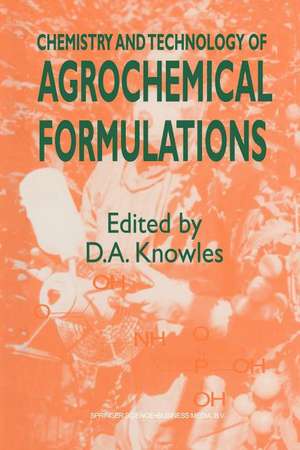Chemistry and Technology of Agrochemical Formulations
Editat de A. Knowlesen Limba Engleză Paperback – 25 sep 2012
This book covers issues around international product quality and safety standards and describes the current and likely future trends which will carry the industry forward into the next millennium. It brings together well known international experts with many years of practical experience from agrochemical companies, consultancies, academic institutions and regulatory bodies.
Chemists and technologists involved in developing new or improved agrochemical formulations will find this book an essential reference in the course of their work. The book will also be of interest to those working in research and development departments of raw material suppliers, as a concise review of this important field.
| Toate formatele și edițiile | Preț | Express |
|---|---|---|
| Paperback (1) | 1823.70 lei 6-8 săpt. | |
| SPRINGER NETHERLANDS – 25 sep 2012 | 1823.70 lei 6-8 săpt. | |
| Hardback (1) | 1830.03 lei 6-8 săpt. | |
| SPRINGER NETHERLANDS – 31 aug 1998 | 1830.03 lei 6-8 săpt. |
Preț: 1823.70 lei
Preț vechi: 2224.03 lei
-18% Nou
Puncte Express: 2736
Preț estimativ în valută:
349.07€ • 379.30$ • 293.41£
349.07€ • 379.30$ • 293.41£
Carte tipărită la comandă
Livrare economică 21 aprilie-05 mai
Preluare comenzi: 021 569.72.76
Specificații
ISBN-13: 9789401060806
ISBN-10: 9401060800
Pagini: 464
Ilustrații: XVII, 440 p.
Dimensiuni: 155 x 235 x 24 mm
Greutate: 0.64 kg
Ediția:Softcover reprint of the original 1st ed. 1998
Editura: SPRINGER NETHERLANDS
Colecția Springer
Locul publicării:Dordrecht, Netherlands
ISBN-10: 9401060800
Pagini: 464
Ilustrații: XVII, 440 p.
Dimensiuni: 155 x 235 x 24 mm
Greutate: 0.64 kg
Ediția:Softcover reprint of the original 1st ed. 1998
Editura: SPRINGER NETHERLANDS
Colecția Springer
Locul publicării:Dordrecht, Netherlands
Public țintă
ResearchCuprins
1 Introduction.- References.- 2 Review of major agrochemical classes and uses.- 2.1 Introduction.- 2.2 Future needs.- 2.3 World markets, 1996.- 2.4 Sales by category, 1995.- 2.5 Sales by crop, 1995.- 2.6 Sales by region, 1995.- 2.7 Herbicides.- 2.8 Insecticides.- 2.9 Fungicides.- 2.10 Plant growth regulators.- 2.11 Biological screening: discovery and development of a new agrochemical.- References.- 3 Formulation of agrochemicals.- 3.1 Introduction.- 3.2 Conventional formulations.- 3.3 New-generation formulations.- 3.4 Surfactants for agrochemicals.- 3.5 Other formulation additives.- References.- 4 Water-dispersible granules.- 4.1 Introduction.- 4.2 Manufacturing methods.- 4.3 Physical properties.- 4.4 Design: modern methods.- References.- 5 Recent developments on safer formulations of agrochemicals.- 5.1 Introduction.- 5.2 Liquid formulations.- 5.3 Controlled-release formulations.- 5.4 Water-soluble packaging.- 5.5 Dry products (water-dispersible granules).- 5.6 Adjuvants.- 5.7 Other formulation types.- 5.8 Summary and future possibilities.- References.- 6 Agrochemical formulations using natural lignin products.- 6.1 Introduction.- 6.2 Wettable powders (WP).- 6.3 Water-dispersible granules (WG).- 6.4 Suspension concentrates (SC).- 6.5 Oil-in-water emulsions (EW).- 6.6 Controlled release.- 6.7 Ultraviolet protection.- 6.8 Compatibility agents.- 6.9 Adjuvants.- 6.10 Complexing agents.- 6.11 Environmental and regulatory information.- References.- 7 Novel surfactants and adjuvants for agrochemicals.- 7.1 Polymeric surfactants and stability.- 7.2 Trends towards environmentally safer surfactants.- 7.3 Enhancing biological activity using adjuvants.- Acknowledgements.- References.- 8 Improving agrochemical performance: possible mechanisms for adjuvancy.- 8.1 Introduction.- 8.2Chemical composition of adjuvants.- 8.3 Mechanistic approaches for investigating adjuvancy.- 8.4 Future prospects.- Acknowledgements.- References.- 9 Packaging of agrochemicals.- 9.1 Selection of packaging types.- 9.2 Closures.- 9.3 Labelling.- 9.4 Shelf life.- 9.5 Pack design with regard to easy rinsing and disposal.- 9.6 Types of secondary packaging.- 9.7 United Nations performance tests.- 9.8 Rinsing methods.- 9.9 Closed transfer systems.- 9.10 Collection of containers after use.- 9.11 Summary of key design criteria.- 9.12 Returnable packaging systems.- 9.13 ECPA standard SVR interface.- 9.14 Future direction.- Glossary of terms and definitions.- 10 Application techniques for agrochemicals.- 10.1 Hydraulic nozzles.- 10.2 Portable sprayers.- 10.3 Tractor sprayers.- 10.4 Aerial application.- 10.5 ULV and CDA ground application.- 10.6 Fogs, mists and aerosols.- 10.7 Electrostatically charged applications.- 10.8 Chemigation.- 10.9 Granule, dust and seed treatments.- 10.10 Miscellaneous.- 10.11 Standards.- References.- 11 Regulatory requirements in the European Union.- 11.1 Introduction.- 11.2 Some basic features of 91/414/EEC.- 11.3 Overview of authorizations.- 11.4 Data requirements.- 11.5 Dossier preparation.- 11.6 Inclusion of active substances in Annex I of 91/414/EEC.- 11.7 Authorization of plant protection products.- 11.8 Transitional measures and the review programme.- 11.9 Adjuvants.- Acknowledgements.- Appendix 11.A An overview of European Community general legislation associated with plant protection products.- 12 Regulatory requirements in the USA.- 12.1 Introduction.- 12.2 Federal pesticide laws.- 12.3 EPA Office of Pesticide Programs.- 12.4 Product registration: obtaining a license to sell.- 12.5 Registration and tolerance data requirements.- 12.6 Data evaluation.- 12.7 Data protection and compensation.- 12.8 Reregistration and product defense.- 12.9 Product labeling.- 12.10 State registration requirements.- 12.11 Conclusions.- Acknowledgements.- Appendix 12.A Index of EPA study guidelines.- Appendix 12.B Sources of registration information.- Appendix 12.C Office of Pesticide Programs: senior EPA contacts.- References.- 13 Waste management and disposal of agrochemicals.- 13.1 Introduction.- 13.2 Site management responsibilities.- 13.3 Waste minimization.- 13.4 Waste types.- 13.5 Waste handling.- 13.6 Documentation and records.- 13.7 Waste disposal.- 13.8 Treatment and disposal of aqueous effluents arising from formulation and packaging of agrochemical products.- References.
Notă biografică
Allan Knowles is a specialist in the formulation of agrochemical products and principal of FORM-AK Formulation Consultancy Services, UK










